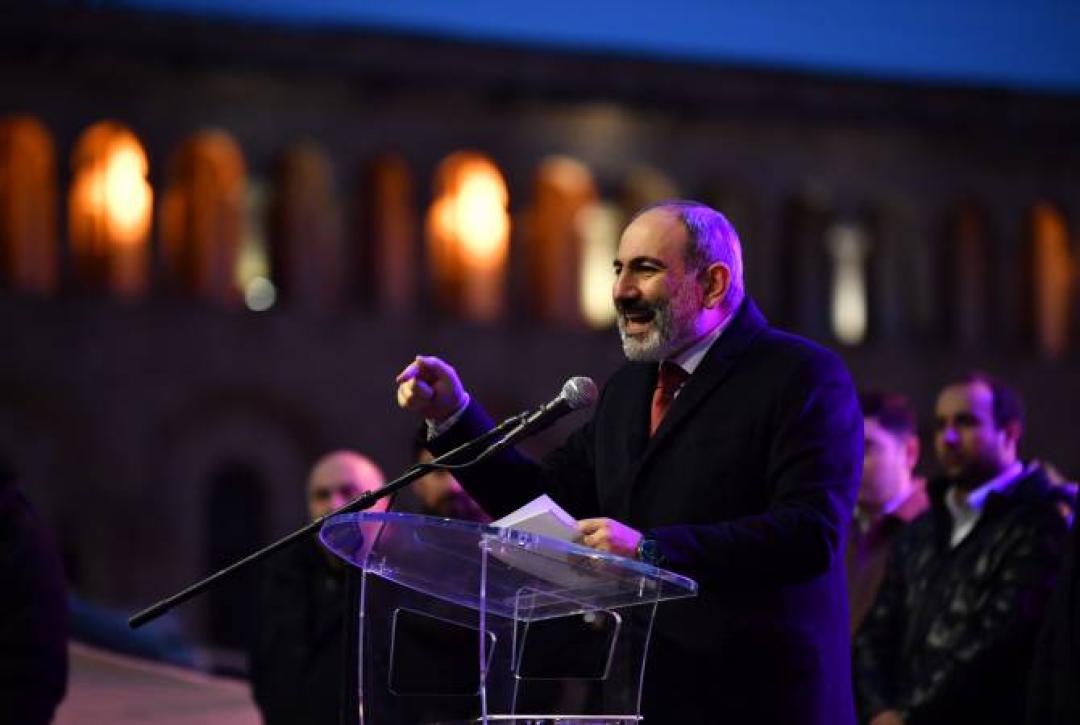
Political turmoil in Armenia: Pashinyan and Sarkissian meet to discuss current situation; three protests held in Yerevan

On 1 March, Armenia’s Prime Minister Nikol Pashinyan met with the country’s President Armen Sarkissian to discuss the political situation in the country after an open confrontation between Pashinyan and Armenia’s Armed Forces (Caucasus Watch reported).
Sarkissian’s press service emphasised that the parties touched upon the internal political situation in the country, but added that “other information disseminated is absolutely false and is an attempt to further exacerbate an already tense situation.” The social networks in the country speculated that during the meeting Pashinyan demanded that Sarkissian sign a decree on the dismissal of chief of the general staff of the armed forces Onik Gasparyan.
It should be noted that on 27 February, Sarkissian refused to sign the decree to dismiss Gasparyan from his post, saying that the decree appeared to be unconstitutional and would deepen the “unprecedented” political crisis in the country. Sarkissian’s press service further emphasised that the president “exercises his functions exclusively through powers determined by the Constitution, impartially and makes decisions, guided exclusively by national interests.” According to the statement, the president did not represent the interests of any political force and “repeatedly proposed and reaffirmed his readiness to consolidate political forces at the negotiating table to smooth over differences and search for mutually acceptable solutions.
Prior to the meeting, Armenia’s Security Council urged Sarkissin to sign the document. “The Constitution clearly defines the impermissibility of involving armed forces in the political processes and the circumstance of being under civilian control. According to the law, the appointment and release motion of the person holding the highest military post of the chief of the general staff of the armed forces is at the discretion of the head of the government. Stemming from above mentioned, the Security Council urges the president to uphold the motion of the PM to release the chief of the general staff from the post and sign relevant decree,” the statement read.
The parliamentary leader of the ruling My Step faction Lilit Makunts stated that their faction was ready to discuss the dissolution of parliament and holding snap polls to end the ongoing crisis. She told the reporters that the bloc did not support another proposal voiced by the leader of the opposition Bright Armenia party Edmon Marukyan. This proposal stated that Prime Minister Nikol Pashinyan should invalidate his draft decree to sack Onik Gasparyan. Marukyan gave the proposal to Pashinyan so he could take back his motion to remove Onik Gasparyan and to restore his deputy. Marukyan said that Bright Armenia would sign any memorandum saying that they will not nominate any candidate for the post of Prime Minister in case of Pashinyan’s resignation. After his resignation, parliament would be dissolved, and elections would be held.
Three rallies were simultaneously held in Yerevan parallel to the political processes in the country. The first protest was arranged by Armenia’s former President Levon Ter-Petrosyan and his Armenian National Congress party to commemorate the ten demonstrators and policemen who died during the street confrontation on 1 March 2008, when the opposition challenged the results of the presidential elections. The second protest was held by the opposition Homeland Salvation Movement, which even managed to break into a government building. “We wanted to show that we can enter any building we want,” the activists said. The third and final protest was organised by Pashinyan and his supporters, who according to media reports were gathered by bus from various regions of the country.
At the rally of Pashinyan’s supporters, the PM statemphasizedd that Armenia might change its political system to a semi-presidential one. “Today we see that this Constitution, unfortunately, is creating many crisis opportunities and risks. We must finally admit it. We need to work to adopt a new Constitution or constitutional amendments in October this year by a nationwide referendum. And finally, the transition to a semi-presidential form of government should be one of the possible options. And we must carry out this process in close cooperation with the parliament, the government, the president, political forces and public,” he said.
“Over the next month, we must work in the same formats - the government, the National Assembly, the president, political forces - to improve those articles that can be improved through consultations and votes in parliament. There is work to be done. Our most important task should be the creation and formation of such constitutional structures that will guarantee security in Armenia and exclude the formation of such crises,” he added.
Another interesting development that happened on the same day was the response of Pashinyan’s spokesperson Mane Gevorgyan regarding the prime minister’s statement regarding the Russian Iskander missiles which enraged many Russian officials (Caucasus Watch reported). “As a result of a combination of the existing facts and data Armenia’s PM came to the conclusion that he was not given the correct information. Moreover, the statement of the prime minister has no relation to the content and quality of Armenian-Russian allied relations in the military and military political cooperation. And the circumstance that the Russian weapon is one of the best in the world is beyond any doubt,” she said, adding that Armenia continues close cooperation with Russia in military industrial and high tech sectors and is planning to take steps in boosting it more.
See Also


Armenia Records 5.9% GDP Growth in 2024, Missing 7% Goal

Yerevan Balances Strategic Ties with Both US and Russia, Says Foreign Minister

FM Mirzoyan: Peace Deal with Azerbaijan Is Within Reach

Pashinyan and Erdogan Hold Call, Reaffirm Commitment to Ongoing Dialogue

